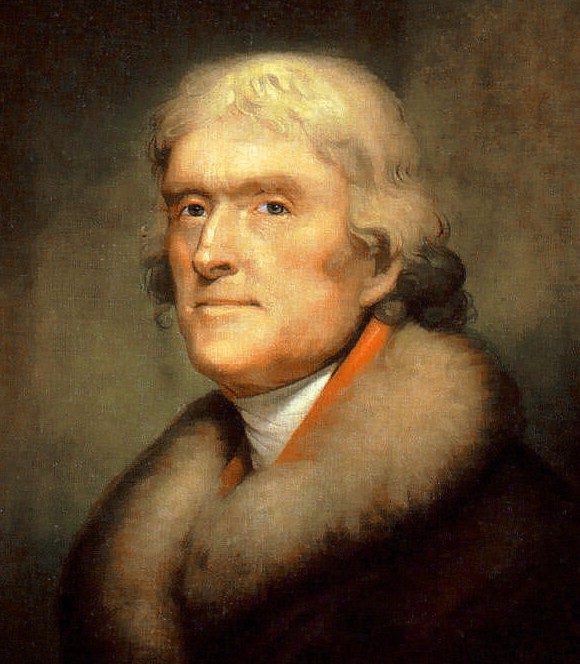Frases célebres de Thomas Jefferson
Frases de libros de Thomas Jefferson
Frases de fe de Thomas Jefferson
Variante: «El árbol de la libertad debe ser vigorizado de vez en cuando con la sangre de patriotas y tiranos: es su fertilizante natural»
Fuente: Carta con fecha del 13 de agosto de 1786 dirigida a su amigo George Wythe.
Cita con múltiples atribuciones desde al Antiguedad Clásica hasta el siglo XX.
Thomas Jefferson Frases y Citas
Fuente: Carta a Isaac McPherson, 13 de agosto de 1813.
Fuente: Thomas Jefferson to Isaac McPherson, 26 de septiembre, 2011, The University of Chicago, 1987, The Founders' Constitution, inglés http://press-pubs.uchicago.edu/founders/documents/a1_8_8s12.html,
Sobre miembros del clero los cuales trataban de lograr alguna forma de Cristianismo oficial en el gobierno de EE.UU. Carta al Dr. Benjamin Rush, 23 de septiembre de 1800.
“Es más honorable reparar un mal que persistir en él.”
Fuente: Carta a los jefes de la nación Cherokee, 1806.
Fuente: Jefferson, Thomas, Autobiografía y otros escritos, Madrid:Tecnos, 1987, página 618.
Fuente: Letter to John Taylor, 26 de septiembre, inglés http://teachingamericanhistory.org/library/index.asp?document=308,
Thomas Jefferson: Frases en inglés
Letter to Judge John Tyler http://www.constitution.org/tj/jeff11.txt (June 28, 1804); in: The Writings of Thomas Jefferson, Memorial Edition (ME) (Lipscomb and Bergh, editors), 20 Vols., Washington, D.C., 1903-04, Volume 11, page 33
1800s, First Presidential Administration (1801–1805)
“Blest is that nation whose silent course of happiness furnishes nothing for history to say.”
Letter to Count Diodati (29 March 1807)
1800s, Second Presidential Administration (1805-1809)
1800s, Second Inaugural Address (1805)
1810s, Letter to H. Tompkinson (AKA Samuel Kercheval) (1816)
ME http://www.yamaguchy.netfirms.com/7897401/jefferson/eppes.html 13:275
1810s, Letters to John Wayles Eppes (1813)
Commonly quoted on many websites, this quotation is actually from an address by President Gerald Ford to the US Congress (12 August 1974) http://www.bartleby.com/73/714.html
Misattributed
Letter to Alexander von Humboldt (6 December 1813)
Scanned letter at The Library of Congress http://memory.loc.gov/cgi-bin/ampage?collId=mtj1&fileName=mtj1page047.db&recNum=74&itemLink=/ammem/mtjhtml/mtjser1.html&linkText=7
Transcript at The Library of Congress http://memory.loc.gov/cgi-bin/query/r?ammem/mtj:@field(DOCID+@lit(tj110127))
1810s
"A death-bed Adieu from Th. J. to M. R." Jefferson's poem to his eldest child, Martha "Patsy" Randolph, written during his last illness in 1826. http://www.loc.gov/rr/program/bib/prespoetry/tj.html Two days before his death, Jefferson told Martha that in a certain drawer in an old pocket book she would find something intended for her. https://books.google.com/books?id=1F3fPa1LWVQC&pg=PA429&dq=%22in+a+certain+drawer+in+an+old+pocket+book%22&hl=en&sa=X&ei=NDa2VJX_OYOeNtCpg8gM&ved=0CCQQ6AEwAQ#v=onepage&q=%22in%20a%20certain%20drawer%20in%20an%20old%20pocket%20book%22&f=false The "two seraphs" refer to Jefferson's deceased wife and younger daughter. His wife, Martha (nicknamed "Patty"), died in 1782; his daughter Mary (nicknamed "Polly" and also "Maria," died in 1804
1820s
Notes on Religion (October 1776), published in The Works of Thomas Jefferson in Twelve Volumes http://oll.libertyfund.org/ToC/0054.php, Federal Edition, Paul Leicester Ford, ed., New York: G. P. Putnam's Sons, 1904, Vol. 2 http://oll.libertyfund.org/Texts/Jefferson0136/Works/0054-02_Bk.pdf, p. 256
1770s
1780s, Letter to Thomas Mann Randolph (1787)
Attributed by an unnamed "distinguished officer of the United States Government" in the Sixth Report of the American Temperance Society, May, 1833, pp. 10-11 http://books.google.com/books?id=h_c0wbAOQ5kC&pg=PA237&dq=%22The+habit+of+using+ardent+spirit%22.
Later variant: Were I to commence my administration again,... the first question I would ask respecting a candidate would be, "Does he use ardent spirits?"
Attributed
1810s, Letter to Edward Coles (1814)
Letter to Albert Gallatin (16 June 1817). Published in The Works of Thomas Jefferson in Twelve Volumes http://oll.libertyfund.org/ToC/0054.php, Federal Edition, Paul Leicester Ford, ed., New York: G. P. Putnam's Sons, 1904, Vol. 12 http://oll.libertyfund.org/Texts/Jefferson0136/Works/0054-12_Bk.pdf, p. 73
1810s
Letter to Elias Shipman and others of New Haven (12 July 1801). Paraphrased in John B. McMaster, History of the People of the United States (ii. 586): "One sentence will undoubtedly be remembered till our republic ceases to exist. 'No duty the Executive had to perform was so trying,' [Jefferson] observed, 'as to put the right man in the right place.'"
1800s, First Presidential Administration (1801–1805)
Letter to his son-in-law Thomas Mann Randolph (7 February 1809) on the termination of the American embargo.
1800s, Second Presidential Administration (1805-1809)
1810s, Letter to H. Tompkinson (AKA Samuel Kercheval) (1816)
Query XIV
1780s, Notes on the State of Virginia
Quoted in [1906, Six Historic Americans, John E., Remsburg, chapter 2, New York, The Truth Seeker Company, 13504056M, 2219498, 74, http://www.archive.org/details/sixhistoricameri00rems], who claimed it to be from a letter to "Dr. Woods." The full letter is never reproduced, and the Jefferson Foundation lists http://www.monticello.org/site/jefferson/superstition-christianity-quotation the quotation as spurious.
Disputed
“Politics, like religion, hold up the torches of martyrdom to the reformers of error.”
Letter to James Ogilvie (4 August 1811)
1810s
Letter to Benjamin Waterhouse (13 October 1815). Published in The Works of Thomas Jefferson in Twelve Volumes http://oll.libertyfund.org/ToC/0054.php, Federal Edition, Paul Leicester Ford, ed., New York: G. P. Putnam's Sons, 1904, Vol. 11 http://oll.libertyfund.org/Texts/Jefferson0136/Works/0054-11_Bk.pdf, p. 492
1810s
Letter to http://press-pubs.uchicago.edu/founders/documents/v1ch15s32.html James Madison (28 October 1785)
1780s
Thomas Jefferson to Jacob De La Motta, September 1, 1820. Manuscript Division, Papers of Thomas Jefferson. http://www.jewishvirtuallibrary.org/jsource/loc/madison.html For the background of the letter see "Thomas Jefferson's Letter on Religious Freedom" Dr. Kenneth Libo Ph.D and Michael Skakun from the Center for Jewish History, New York City, New York. http://sephardicoralhistory.org/education/essays.php?action=show&id=19
1820s
Letter to Nathaniel Macon (12 January 1819) http://books.google.com/books?id=oiYWAAAAYAAJ&q=%22Honesty+is+the+first+chapter+in+the+book+of+wisdom%22&pg=PA112#v=onepage
1810s
Draft Constitution for Virginia (June 1776) http://avalon.law.yale.edu/18th_century/jeffcons.asp
1770s
“I believe the Indian then to be in body and mind equal to the white man.”
1780s, Letter to the Marquis de Chastellux (1785)
Letter to Charles Pinckney (1820) ME 15:280
Posthumous publications, On financial matters
Letter, Thomas Jefferson to Nathaniel Macon, 1821: ME 15-341, as quoted in The Assault on Reason, Al Gore, A&C Black (2012, reprint), p. 87 : ISBN 1408835800, 9781408835807, and Federal Jurisdiction, Form #05.018, Sovereignty Education and Defense Ministry (2012)
1820s
1780s, Letter to George Rogers Clark (1780)
